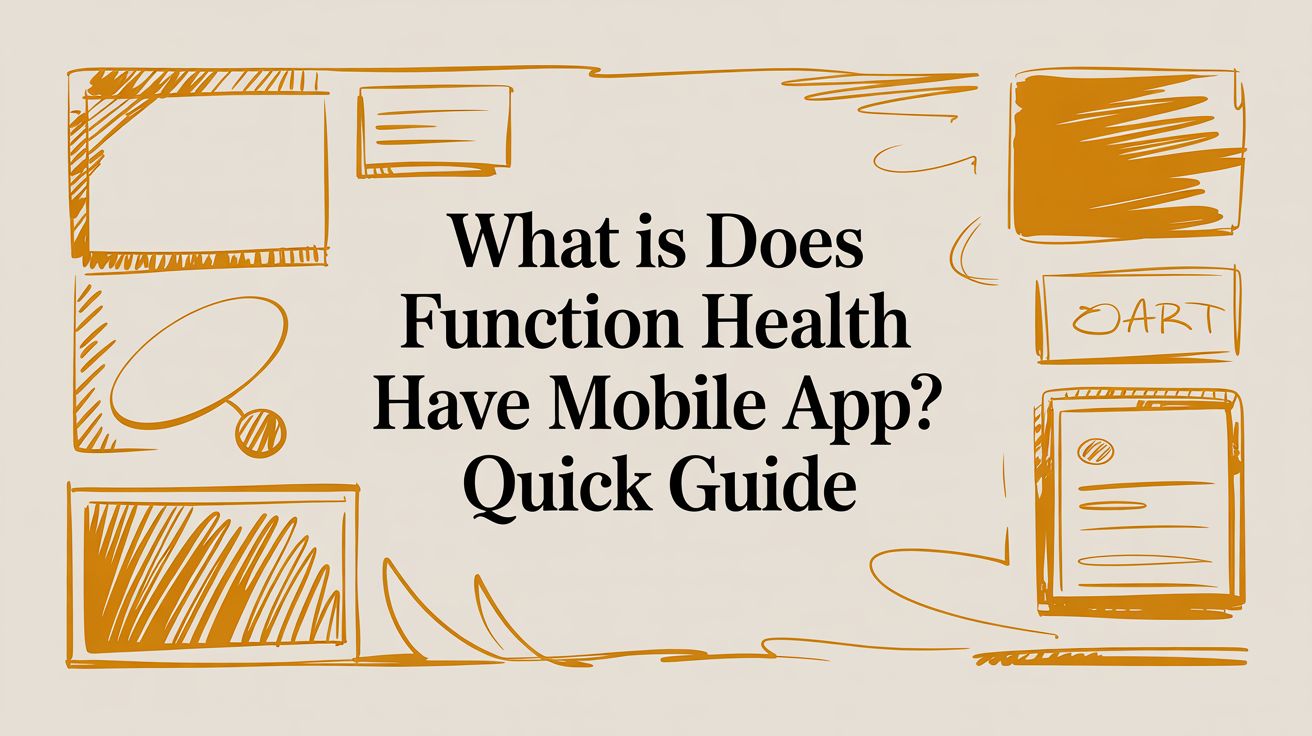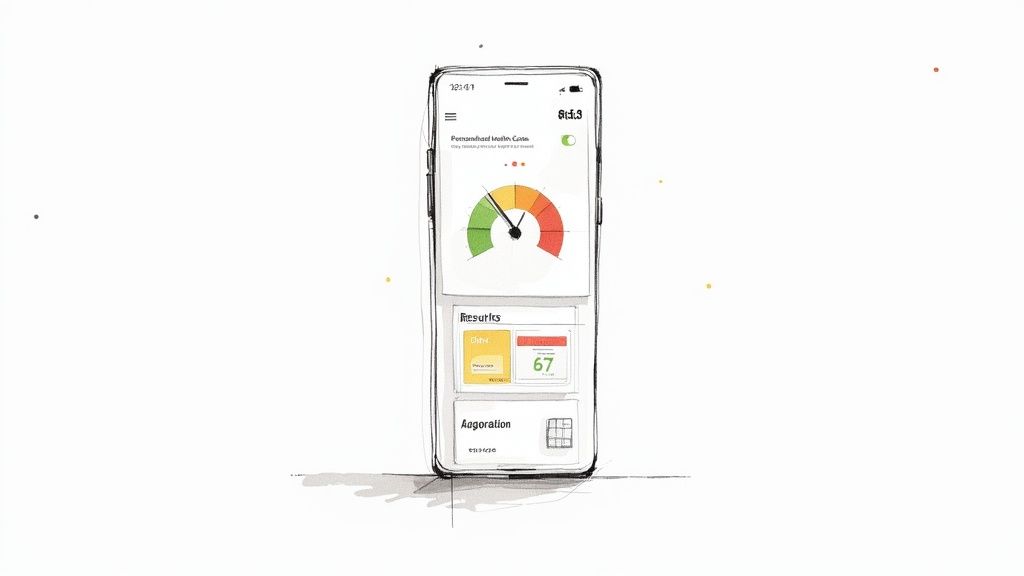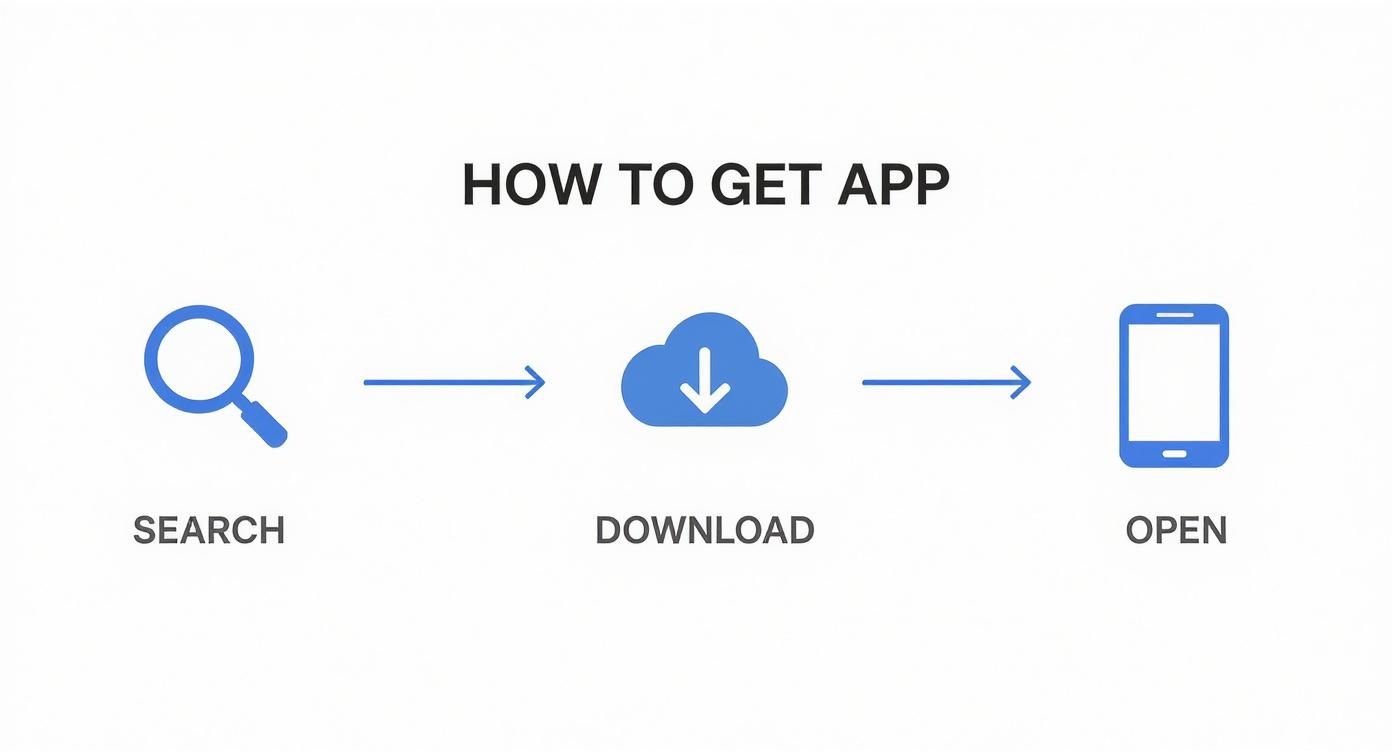does function health have mobile app? Discover core features on iOS and Android, setup tips, and top alternatives.

Yes, Function Health offers a mobile app for both iOS and Android, which is a significant advantage for anyone wanting to monitor their health data without being tethered to a computer.
It essentially puts your lab results, health scores, and personalized insights directly into your pocket.

Think of the Function Health app as more than just a place to see your results; it’s designed to be a dynamic dashboard for your body. The core concept is to take complex data from over 100 yearly lab tests and make it easy to follow over time.
For a deeper look into the tests and what they mean, you might find our full analysis of Function Health's blood testing services helpful.
The main purpose of the app is translating complicated biomarker data into something you can understand and act upon. By putting this information at your fingertips, you can more easily spot trends and make informed decisions about your health in consultation with your healthcare provider.
In short, the app is your portable command center for your health metrics.
Here’s a quick rundown of what you need to know about the app.
This table shows that the app is built for current members and focuses on making their data accessible wherever they are.
The app doesn't just present numbers—it gives them context. You can see how specific biomarkers are impacting your overall health scores in key areas like heart health, metabolic function, and inflammation.
The interface uses visual gauges and clear summaries to show you what is within an optimal range and what might need a closer look. This means you can quickly see your overall health score and then investigate the specific results that are driving that number, helping you understand the story your body is telling.
Disclaimer: This article is for informational purposes only and is not a substitute for professional medical advice. Always consult a healthcare provider before making any lifestyle or medication changes.
So, what does the Function Health app actually do? Think of it as your personal health translator. It takes complex data from over 100 biomarkers and turns it into a simple, visual health dashboard that helps you see the bigger picture.
Imagine your lab results are just scattered dots on a map. On their own, they may not mean much. The app connects those dots, showing you clear trends and patterns over time. This is how you can track progress in key areas like metabolic health, inflammation, and hormone balance, all from your phone.

One of the app's key features is how it clarifies medical jargon. Instead of just presenting a number, it provides context. For instance, it'll explain what something like hs-CRP (high-sensitivity C-reactive protein) actually is—a key marker for inflammation—in plain English. According to a scientific statement from the American Heart Association, higher hs-CRP levels can be associated with an increased risk of future cardiovascular events.
In summary: The app doesn't just give you data; it helps tell the story of what's happening inside your body. It translates raw numbers into a clearer narrative, highlighting where your metrics are optimal and where you could focus on improvement.
The heart of the app experience is a personalized dashboard that groups your results into logical categories. This visual setup makes it easier to see which systems are functioning well and which might need more attention.
Here are a few of the key features you'll find inside:
Ultimately, the goal is to provide you with the information needed to take a more active role in your health. By making complex health data accessible and understandable, the Function Health app can help clear a path for optimizing your health for the long term.
Disclaimer: This article is for informational purposes only and is not a substitute for professional medical advice. Always consult a healthcare provider before making any lifestyle or medication changes.
Getting the Function Health mobile app is straightforward. It’s available on the major app marketplaces for both iPhone and Android users.
Just open the Apple App Store on your iOS device or the Google Play Store on your Android. Type "Function Health" into the search bar and look for the official app. To ensure you're downloading the authentic application, verify that it's published by "Function Health, Inc."
Once you've found it, you're just a couple of taps away. Double-checking that developer name is the best way to avoid any unofficial apps.
Here’s a look at the official app listing on the Google Play Store so you know what you’re looking for.
You can see the official name, the developer, and the user rating right there—everything you need to confirm it’s legitimate before you download.
Occasionally, a download might encounter an issue. This can often be resolved by checking for a stable Wi-Fi connection or ensuring you have enough storage space on your device.
As for compatibility, the app requires iOS 15.0 or later for Apple devices. For Android, the requirements can vary but it generally runs on most modern versions. If you’re exploring different health platforms, you might find similar guides helpful, like this one that answers whether Mito Health has a mobile app.
This article is for informational purposes only and is not a substitute for professional medical advice. Always consult with a healthcare provider before making any changes to your lifestyle or health regimen.
Think of your Function Health results as the "what"—a detailed snapshot of your internal biology. It’s the foundational data. But to get to the "how"—turning those insights into lasting habits—specialized tracking apps can be excellent partners. These tools are useful for connecting your daily actions to your long-term health goals.
For instance, if your Function report highlights a need to improve heart health, a dedicated app can provide the daily structure to make it happen. It's this combination of deep biological data and daily tracking that can create a complete, actionable picture of your wellness journey.
When it comes to cardiovascular wellness, some apps are built specifically for that purpose. Here is a list of apps for tracking habits and heart health:
Building a small, curated suite of these tools allows you to target specific areas for improvement with focused attention. You can explore more options in our guide to the best health tracking apps.
No matter which app you choose, the download process is usually the same simple, three-step flow.

This just shows the universal process: search for an app in your phone's store, download it, and open it up to get started.
To put things in perspective, here's a quick look at how a comprehensive data platform like Function Health compares to more specialized daily tracking apps.
Ultimately, the goal is to use these tools together. Function Health provides the roadmap, while apps like HeartFit help you navigate the day-to-day journey toward better health.
Disclaimer: This article is for informational purposes only and is not a substitute for professional medical advice. The information provided by health apps should not replace consultation with a qualified healthcare professional. Always talk to your doctor before making significant changes to your lifestyle or treatment plan.
Your health app is more than just a collection of numbers; it's a tool for having better, more productive conversations with your doctor. Think of your Function Health data as a detailed log of what’s happening inside your body. Bringing this information to your appointments can turn a routine check-up into a collaborative strategy session for your health.
Instead of only describing symptoms or how you've been feeling, you can point to specific data points and trends. This gives your doctor a much clearer, more complete picture to work with, helping them tailor their advice specifically to your unique biology.

A little preparation can go a long way in making your conversation effective. Before you head to the clinic, take a few minutes to review your app and identify the key points you want to cover.
Here’s a simple framework to get you started:
This kind of focused approach helps keep the conversation on what matters most. Guidance from the National Institutes of Health (NIH) suggests that when patients actively participate and communicate clearly, their health outcomes can improve.
By bringing data-driven observations to the table, you become an active partner in your healthcare. You’re not just a patient; you’re a well-informed advocate for your own well-being, helping your doctor create a more effective care plan with you.
Disclaimer: This article is for informational purposes only and is not a substitute for professional medical advice. Always consult with a healthcare provider before making any changes to your lifestyle or health regimen.
Here are answers to some of the most common questions people have about the Function Health mobile app.
You can download the app itself from the Apple App Store or Google Play Store completely free of charge.
However, the core functionality of the app—viewing your lab results, personalized health scores, and actionable insights—is available only to paying Function Health members. The app is the portal to access the services included in the membership.
The Function Health app is designed for modern smartphones. To ensure it runs correctly, your phone needs to meet certain requirements.
The safest approach is to check the official app page on the App Store or Google Play for the most current compatibility information before you download.
Function Health states that they use industry-standard security measures, like data encryption, to protect your personal details and lab results.
The platform is designed to be HIPAA-compliant. This refers to the Health Insurance Portability and Accountability Act, a US federal law that sets national standards to protect sensitive patient health information from being disclosed without the patient's consent or knowledge.
Yes, the app is designed to facilitate more productive conversations with your doctor. You can pull up your results, biomarker trends, and health scores on your phone during an appointment. This allows you to show your doctor your health data trends, not just describe them. As experts at respected institutions like the Mayo Clinic often advise, being an active and prepared participant in your own care can lead to better health outcomes.
A normal resting heart rate for most adults is between 60 and 100 beats per minute (bpm). However, factors like fitness level, age, and medications can influence this. For example, a well-trained athlete might have a normal resting heart rate closer to 40 bpm. It's best to discuss your specific heart rate with a healthcare provider.
Hopefully, this gives you a clearer picture of what to expect from the Function Health app.
Disclaimer: This article is for informational purposes only and is not a substitute for professional medical advice. Always consult a healthcare provider before making any changes to your health regimen.
Ready to turn your health data into daily habits? Heart Fit helps you build a sustainable, heart-healthy lifestyle based on your unique results. Start your free trial and see how small, consistent actions can lead to big improvements.
Start Your Free Trial at HeartFit.ai